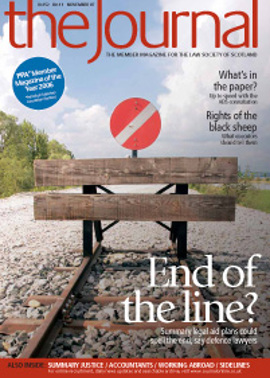PSG offers an offer

The Property Standardisation Group has prepared an offer to sell, continuing our aim of standardising those aspects of commercial property transactions that are not contentious, allowing solicitors to focus on the issues specific to the deal. We have noted with interest the success of the various regional residential missives and felt that the time was right to prepare a commercial equivalent.
We have, however, adopted a different approach to the residential missives in that we have prepared an offer to sell. This was for two main reasons:
- the seller knows all about the property, so can complete an offer to sell with accurate information rather than the purchaser seeking information and putting in general warranties in an offer to purchase;
- our experience has been that proceeding by way of an offer to sell streamlines the property transaction and results in a speedier conclusion of missives.
The PSG continues to encourage sellers to prepare for the sale of a property by using the due diligence questionnaire (available on the PSG website www.psglegal.co.uk) to produce a full package of titles, searches, planning documents, construction documents and other due diligence information.
Starting assumptions
Having decided to produce an offer to sell, we quickly realised that to have any chance of producing an agreed document in the near future we needed to keep it simple, so this first offer to sell is for a property with vacant possession. Now that we have completed this offer we hope to produce an investment offer to sell in the not too distant future.
We have had to make various assumptions and presumptions in drafting the offer, or our drafting would still be ongoing. We refer to the main issues below, but do please read the guidance notes fully before using the offer for the first time to ensure that the approach we have taken fits with the specific transaction and your clients’ instructions.
We have drafted on the basis that:
- the property is sold with vacant possession;
- the offer is not conditional on anything;
- the seller will produce a full package of titles, planning, construction and other due diligence information;
- the purchaser will carry out full due diligence of the property and satisfy itself on title and other matters disclosed by the seller;
- the seller will give some warranties or confirmations on matters that cannot otherwise be verified by the purchaser.
We have aimed to produce a reasonably balanced document but, unlike most of the other PSG documents (which are designed to be used unaltered), the offer to sell should be regarded as a template into which transaction-specific wording can be inserted. We hope that the parties will be able to agree most if not all of the standardised provisions that the offer contains, unless they are unsuitable for particular transactional reasons.
Optional clauses
We have also prepared a separate set of optional clauses which relate to other matters which need to be referred to in offers from time to time, but which are not necessarily always incorporated in every offer, e.g. payment of a deposit, guarantee of purchaser’s obligations, and collateral warranties.
The clause which provoked the most debate in light of recent case law (Black v McGregor and Wipfel Ltd v Auchlochan Developments Ltd) and academic comment was the interest clause. We consulted with Professor Kenneth Reid and Professor William McBryde, both of the University of Edinburgh, about this clause and decided not to incorporate a liquidated damages clause.
We have provided in the usual way for interest (at the normally agreed rate of 4% over base rate) to be payable on the price, if the purchaser does not pay on the date of entry. If the purchaser fails to pay and the seller decides that it wants to rescind the missives and resell the property, we have taken the approach that the seller would no longer be entitled to any interest, and instead, it should look to recover costs and losses actually incurred, which it is entitled to do at common law. Several heads of loss are identified in the offer: re-marketing costs; any shortfall in the price; and generally other financial losses that are actually incurred because of the purchaser’s failure to pay on the date of entry.
We are, as always, grateful to our consultees who have commented in depth on the new offer. We hope that this new addition to the PSG documents will prove useful in continuing to streamline commercial property transactions in Scotland and we look forward to hearing from you with any comments.
Our contact details remain:
iain.macniven@mms.co.uk
douglas.hunter@dundas-wilson.com
ann.stewart@shepwedd.co.uk
rachel.oliphant@mcgrigors.com
Rachel Oliphant, McGrigors LLP
In this issue
- The shape of your future
- The law and the forum
- End of the line?
- Summary justice: the big picture
- Now it's your turn
- Flying south
- Legal rights and the black sheep
- Mediation innovation
- Counting on your CA
- The risk of paper cuts
- Society hits the Net at Murrayfield
- Leading the charge
- Computer says no
- Who, what, where, when, why?
- Getting in on the Act
- Scottish Solicitors' Discipline Tribunal
- Website reviews
- Book reviews
- Well funded work
- PSG offers an offer






